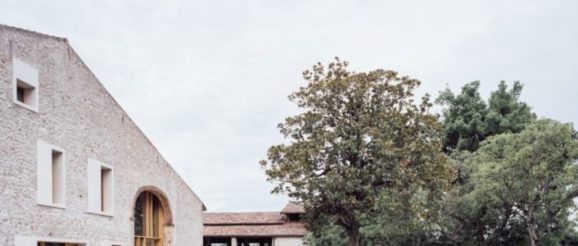Stone barn is transformed into modern, energy-conscious home in Verona | Inhabitat – Green Design, Innovation, Architecture, Green Building

Milan-based architecture practice Studio Wok has revamped a historic stone barn into a contemporary country home using environmentally friendly materials and design choices. Located in the small parish of Chievo in the west of Verona, Italy, the adaptive reuse project carefully respects the architectural heritage of the site while tastefully bringing the residence up to modern living standards. The result is a charming dwelling filled with natural light, warm timber surfaces and framed views of the Italian countryside.
Completed in 2018, the country home in Chievo included the renovation of not only the architecture, but also the surrounding garden in the agricultural court. A massive magnolia tree — preserved upon the clients’ request — forms the focal point of the garden and is edged in by a square black flowerbed next to the new pool bordered by stone flooring.
To emphasize the site’s history and allude to traditional building techniques, the architects peeled back the plaster on the barn’s facade to reveal the river pebbles that make up the load-bearing walls. This honest approach to materials is echoed throughout the house from the exposed timber beams to the minimalist palette with natural finishes. The materials used also reference the local rural vernacular found throughout Verona from the river pebbles grafted onto modern frames in Biancone to the local stone sourced from Lessinia.
A large masonry arch marks the entrance and leads guests into a series of spacious, light-filled living spaces with Vicenza stone paving as well as a library with a brick fireplace. The upper floors house the bedrooms. Warm birch plywood cladding is inserted to bring warmth and delineate the spaces within the home. “The project’s leitmotif is a spatial and material dialogue between history and modernity, and it is also characterized by the great care taken in terms of environmental sustainability,” the firm explained. “In addition to the use of technical devices and systems for efficient energy, special attention has been given to the surrounding territory and landscape in the use of materials and design choices.”
